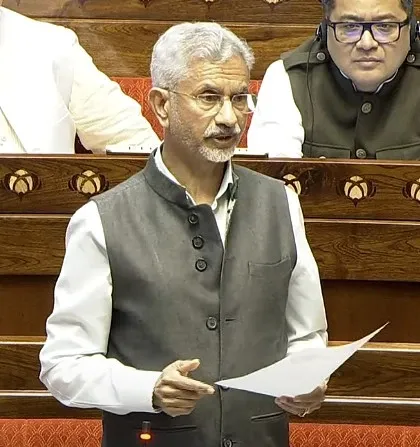Has the Modi Government Corrected Nehru's Mistakes on the Indus Water Treaty?

Synopsis
Key Takeaways
- Modi government suspends Indus Water Treaty due to terrorism.
- Jaishankar highlights historical mistakes by Nehru.
- Significant military and diplomatic measures taken.
- Importance of national security emphasized.
- Global solidarity expressed towards India.
New Delhi, July 30 (NationPress) External Affairs Minister (EAM) S. Jaishankar articulated on Wednesday that the Modi administration has rectified the historical blunders committed by the former Prime Minister Jawaharlal Nehru concerning the Indus Water Treaty (IWT) by placing it in abeyance until Pakistan halts its support for cross-border terrorism.
During a discussion in the Rajya Sabha regarding Operation Sindoor, EAM Jaishankar commenced by expressing profound gratitude to the Indian Armed Forces.
He cited the April 22 Pahalgam terror incident, remarking, "This was a deeply disturbing attack for several reasons: the manner in which individuals were killed before their families, the demand for their religion before their execution, and the intention behind it to ruin the economy of Jammu and Kashmir, which had returned to prosperity and normalcy following the revocation of Article 370. All of this stirred anger across the nation. There was sorrow and shock. Globally, there was an outpouring of solidarity and sympathy."
He stressed that such an attack was entirely unacceptable and crossed India's threshold of tolerance.
"There had to be significant repercussions. The perpetrators and their supporters must be held accountable and face justice," Jaishankar stated.
He highlighted that the decision made by the Cabinet Committee on Security on April 23 was the "first unmistakable signal of India's fury, resolve, and determination."
EAM Jaishankar recollected the crucial measures undertaken, including the cancellation of Pakistani visas under SAARC, a reduction in diplomatic personnel, expulsion of military advisors, and the suspension of the Indus Water Treaty.
Elaborating on the importance of this suspension, he remarked, "The Indus Water Treaty is exceptionally unique. I cannot think of any other agreement globally where a nation has permitted its major rivers to flow to another nation without any rights to those rivers. It was an extraordinary accord, and it is crucial to remember its historical context now that we have suspended it."
Jaishankar referenced parliamentary discussions from the 1960s, citing the then Prime Minister, who allegedly emphasized the need to consider the interests of West Punjab (Pakistan's Punjab).
The EAM indicated that the former PM prioritized Pakistan's interests "over those of our farmers in Kashmir, Punjab, Rajasthan, and Himachal Pradesh."
"Not a word was spoken about the welfare of our own citizens. He claimed, 'We purchased peace.' Yet, within a year, that same Prime Minister acknowledged there was no peace with Pakistan. What we acquired was not peace but appeasement," EAM Jaishankar asserted.
He contended that the treaty, "originally conceived in goodwill and amicability, had lost relevance as India received neither goodwill nor friendship from Pakistan since 1960, only terrorism, assaults, and conflicts."
"Such a treaty required action, and this government took decisive steps," he said.
Reaffirming the Modi government's steadfast stance, Jaishankar stated, "This is not the cost of peace, but rather the cost of appeasement. The Modi government has rectified the missteps of Pandit Nehru's policies by temporarily suspending the Indus Water Treaty with Pakistan. This treaty will remain in abeyance until Pakistan unequivocally renounces its support for terrorism. Blood and water cannot coexist."










